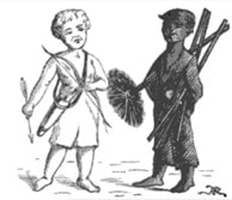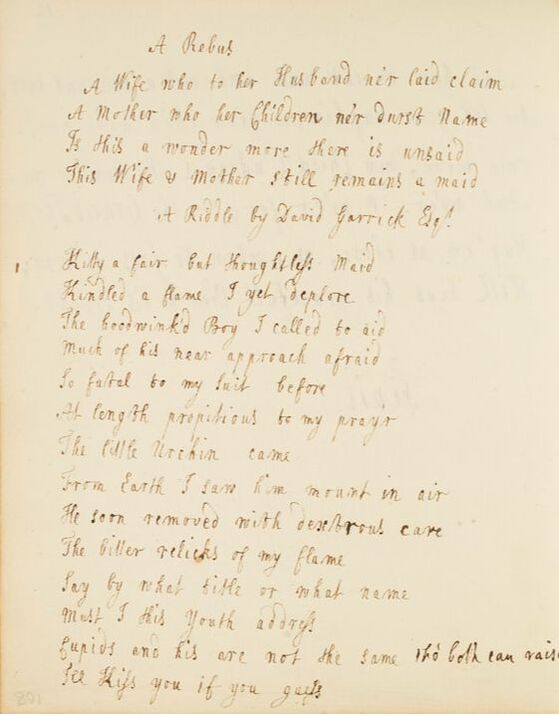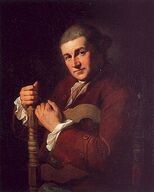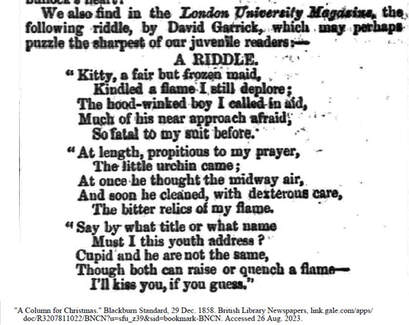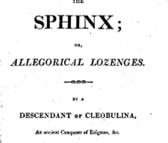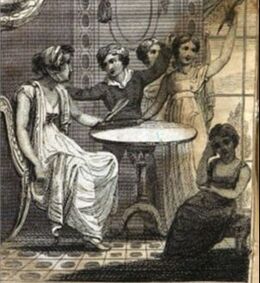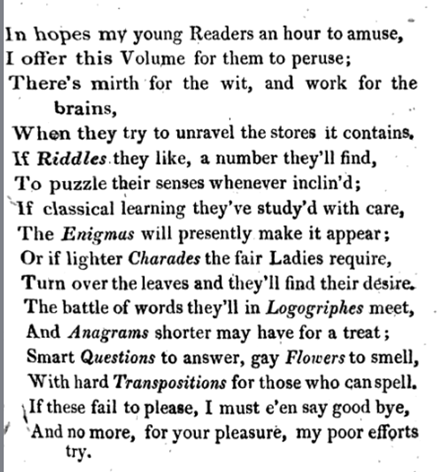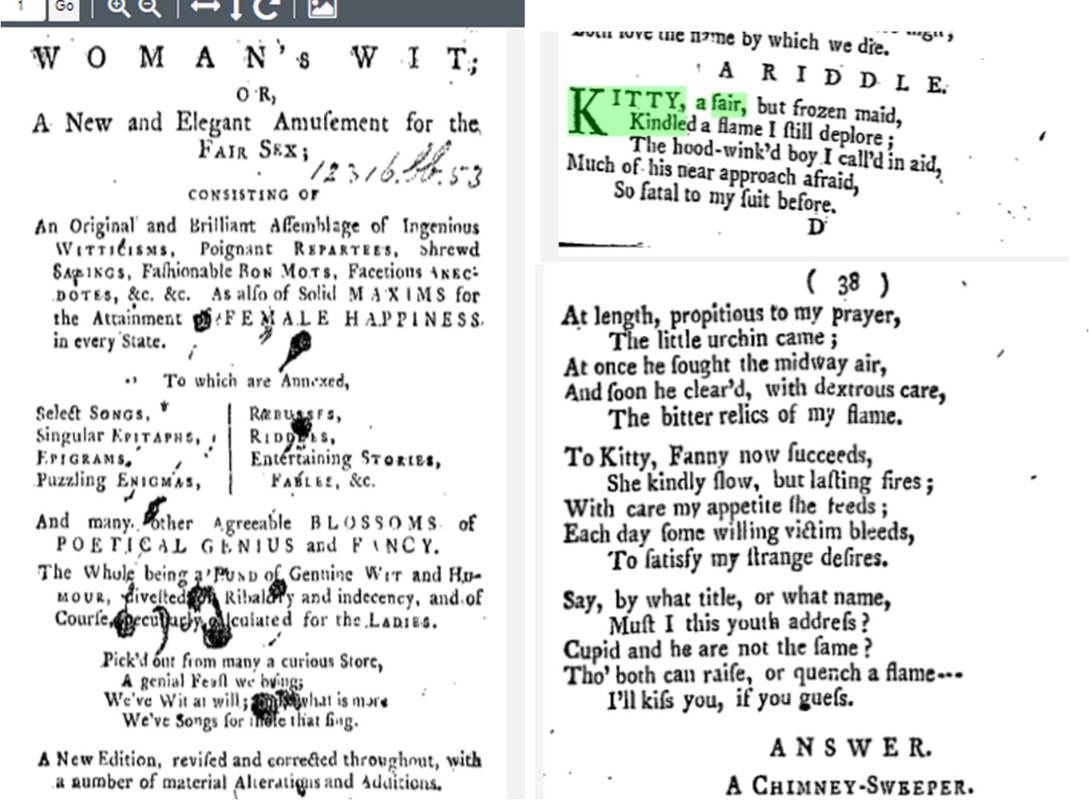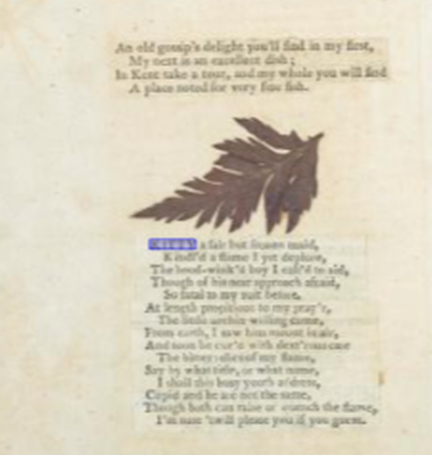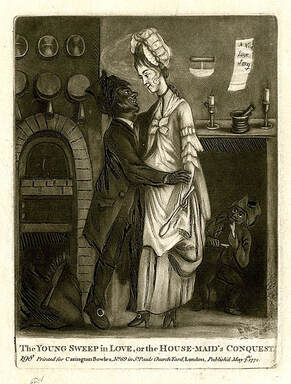The "Kitty Riddle" in Emma
Additional information from way down deep in the rabbit hole
|
My article about Mr. Woodhouse's riddle "Kitty, a Fair But Frozen Maid," appears in the 2022 Persuasions online, the journal of the Jane Austen Society of North America. Here's the introduction to the article:
“Kitty, a Fair but Frozen Maid,” the riddle that Mr. Woodhouse attempts to recall in Emma, is a real poem dating from 1750 or possibly earlier. Traditionally the riddle has been read as full of clever double meanings that point to “Cupid” as the answer when the correct answer is “a chimneysweep,” but in modern times two prominent Austen scholars have argued that the riddle is really about prostitution and venereal disease. Their interpretation has been widely accepted and promulgated and is used to support the argument that Austen was more severely critical of her times than prior scholarship has acknowledged. |
|
My Persuasion article lays out the research I've done to support my argument that this modern interpretation of the riddle is mistaken. The "Kitty" riddle uses classically-derived idioms which were frequently used in the Augustan or Georgian age of poetry. If you want to hear the other side of the argument, an episode of the podcast "The Thing about Austen" with guest scholar Lynn Festa discusses the Kitty riddle from the point of view of it's being an x-rated riddle. Below, I share some information and research that didn't make it into the article.
|
However, the riddle has also been ascribed to others as shown below, including the noted essayist and wit Lord Chesterfield.
The date shown below is the date the attribution was made, not necessarily when the poem is alleged to have been authored.
The date shown below is the date the attribution was made, not necessarily when the poem is alleged to have been authored.
|
The riddle has been attributed to....
See here for more examples of Georgian love poetry which used the words "flames," "victims," "bleeding" and so forth to describe unrequited love or lust. |
Typical version of the riddle:
Kitty, a fair, but frozen maid, Kindled a flame I still deplore; The hood-wink’d boy I call’d in aid, Much of his near approach afraid, So fatal to my suit before. At length, propitious to my pray’r, The little urchin came; At once he sought the midway air, And soon he clear’d, with dextrous care, The bitter relicks of my flame. To Kitty, Fanny now succeeds, She kindles slow, but lasting fires: With care my appetite she feeds; Each day some willing victim bleeds, To satisfy my strange desires. Say, by what title, or what name, Must I this youth address? Cupid and he are not the same, Tho’ both can raise, or quench a flame-- I’ll kiss you, if you guess. Answer: a chimney-sweep |
|
Three-Stanza and Four-Stanza Version -- some speculation
I suggest that the three-stanza version is the earliest version, and the additional stanza about the willing victim[s] who bleed is a later interposition. That third stanza stands out for more than one reason. It has a connection to Cupid in terms of the idiomatic expressions which were used in the 18th century, in that the victim is sacrificed on the altar of love, just as a log is tossed on the fire. But the verse doesn't give us a clue to help us solve the riddle. We have a careful maid building fires and satisfying someone's warm desires. The emphasis is on the fire in the hearth, not on the "little urchin." The clues are there in the first two stanzas (suit/soot) and the final stanza gives one final clue about raising or quenching a flame. The publication history of the riddle shows that sometimes the four stanza version, and sometimes the three stanza version, was published. It's true that the three-stanza version is often used in publications aimed at women or young people and some researchers have referred to the three-stanza version as the "bowdlerized" version. Is there any significance to this? Did some editors find the "willing victims" stanza too jarring? Or did they notice that it doesn't contain any clues? Or they just weren't familiar with this version? We can only speculate. |
So which version of the riddle was Jane Austen acquainted with, the three-stanza or four-stanza version? We will never know, and we don’t know where she first saw it, or if someone recited the riddle to her. Scholars who assert that she must have seen it in this or that publication, such as in the 1771 The New Foundling Hospital for Wit, are probably unaware of just how widely it was re-published and copied into private riddle collections like Harriet Smith's. We also can't know how often it was simply passed along orally as a parlor entertainment.
Other and earlier versions may come to light as more old material is digitized.
Other and earlier versions may come to light as more old material is digitized.
Graphic and obscene riddle is okay for children?
As I point out in my article in Persuasions, the Kitty riddle appears in many publications for women and children. I grant you that very often, the version used is the "three stanza" version, without the verse about the willing victims who bleed. However, according to the modern analysis, there are still plenty of sexual allusions in the three stanza version--references to sex, prostitutes and venereal disease. And, if parents knew the full length, supposedly filthy version of the riddle, would they be all right with its inclusion in a children's book?
Four stanza version okay for ladies?
Here is another appearance of the riddle, all four stanzas, in an undated lady's joke, story and riddle book.
Here is another appearance of the riddle, all four stanzas, in an undated lady's joke, story and riddle book.
|
The Kitty riddle (three stanza version) pasted into a scrapbook kept by one Catherine Gould. I don't think respectable women would have pasted obscene riddles into their scrapbooks.
The charade says" "An old gossip's delight you''ll find in my first, My next is an excellent dish, In Kent take a tour, and my whole you will find A place noted for very fine fish." |
Variations of the riddle
Many minor variations of the riddle have appeared, especially variations of the final line. The difference between “I’ll kiss you if you guess,” and “Tis now for you to guess,” might be the difference between a riddle intended to be read aloud as a parlour game, and a riddle reproduced in a periodical.
Many minor variations of the riddle have appeared, especially variations of the final line. The difference between “I’ll kiss you if you guess,” and “Tis now for you to guess,” might be the difference between a riddle intended to be read aloud as a parlour game, and a riddle reproduced in a periodical.
|
Variations to the first stanza:
“Kitty” is given as “Chloe,” “Delia,” “Nancy,” and "Mary" Kitty a fair but forward maid Kitty a fair but froward maid Kitty, a fair but thoughtless maid The hoodwink’d boy she called in aid The love-winked boy I called in aid Variations to the second stanza: At length the little urchin came From earth I saw him mount the air And by his wand he cured my flame and Soothed my woe with anxious care I saw him spurn the humble ground And wave aloft his Conquering Arms Til high in the air I heard him sound His conquest o’er my vain alarms. Variations to the third stanza: To Kitty, Sally now succeeds, Who kindles slow, but lasting Fires, Each Appetite of mine she feeds (or with care my appetite she feeds) While ev’ry day a Victim bleeds, (or "Who every day a victim bleeds,) (or “each day a willing victim bleeds,”) To satisfy my strange (or warm) Desires. 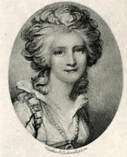 Lady Anne Barnard Lady Anne Barnard
Lady Anne’s version uses four-line stanzas instead of five line stanzas. It omits the “bleeding victims” stanza but the second stanza is elaborated over two stanzas.[i]
A Cold and Heedless Maid When late a cold and heedless maid Had raised a flame I still deplore The Hoodwink’d boy I called in aid Tho’ fatal to my suit before. At length propitious to my prayer The clever little urchin came And soon remov’d with dextrous care The bitter cause of this sad flame. I saw him spurn the humble ground And wave aloft this Conquering Arms Till high in air I heard him sound His conquest o’er my vain alarms. Say by what title or what name Shall I this youthful Boy address? Cupid and he are not the same I’ll Kiss you Lady if you guess. Forbes, Margaret Alice, and Dick, Alexander. Curiosities of a Scots Charta Chest, William Brown, 1897. |
Variations to the fourth stanza:
Cupid and he are not the same/He raises, this prevents a flame Shall I this youthful boy address? Final lines: Tis now for you to guess Read this again and guess I’ll kiss you if you guess This riddle please to guess I’m sure twill please you if you guess Applause waits if you guess. I’ll kiss you Lady if you guess. 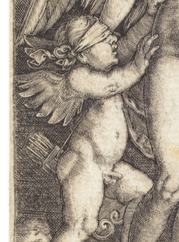 Hoodwink'd boy Hoodwink'd boy
In Sam Roger's version, it is Kitty who calls the hoodwink’d boy for aid, even though she’s afraid. The second stanza continues with Kitty as a main character and observer of the Cupid/chimney-sweep figure. "Suit" becomes "soot."
Kitty a fair but frozen maid Kindled a flame I yet deplore The hoodwinked boy she called to aid But at his near approach afraid, So fatal was his soot before. With glowing cheek, and anxious care She saw him mount from earth to air To aid yet share her heart’s distress The little urchin warmer grew Than Kitty, but, I tell you true, Cupid and he are not the same Though both can raise and quench a flame What then? I’ll kiss you if you guess. Sharpe's London magazine, a journal of entertainment and instruction. conducted by Mrs. S.C. Hall. United Kingdom. 1857? A 1905 one stanza version has nine lines and combines the first stanza with a variation of the final stanza:
Tell me, ye fair, this urchin’s name Who still mankind annoys; Cupid and he are not the same… etc. |
Yes, there are bawdy songs that allude to chimneys and sweeps
Bawdy Songbooks of the Romantic Period Taylor & Francis, 2020 includes some songs that used "chimney-sweeping" as a euphemism for sex. It is all a matter of context. In a nation full of chimneys and fireplaces and chimneysweeps, sometimes "chimney" just meant "chimney. " In the following songs, however, it does not. I'm quoting just enough for context.
|
I am a smutty chimney sweep
About the town I am well known When up the ladies’ flues I creep. The pleasure it is all my own (etc.) |
“A young and sprightly lass” had a house with “a dirty flue,, which was built with so small a space, that nothing would fit her fire-place….
"Miss Mary Grace, wants some one to widen her fireplace.” |
